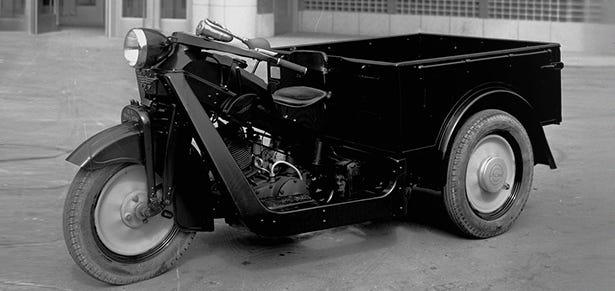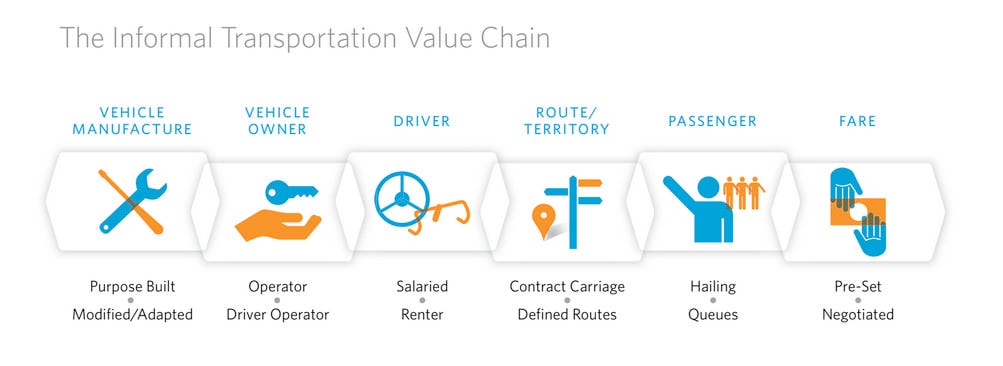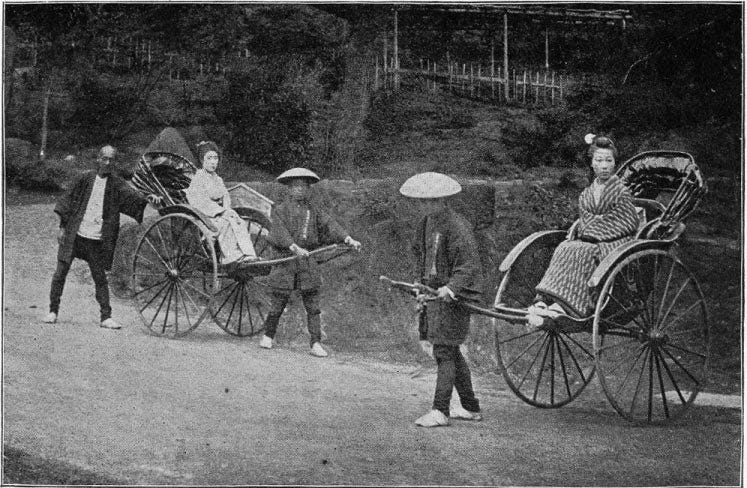
The Mazda-Go 3-wheeled truck from the 1930s. The ancestor and progenitor of the tuktuk and the auto rickshaw.
Hi there, welcome your the 7th issue of Makeshift Mobility, my fortnightly newsletter about innovations in informal transportation.
I started this newsletter because informal transportation is a truly global phenomena and yet, it always seems to be treated as a local problem. Necessity is the mother of invention, they say, and informal transit was invented to solve many problems.
I’m late with this issue. The pandemic makes schedules tentative at best so my sincere apologies. I’ll do better next time.
If you are a first time reader, you can catch all the back issues here. Signing up is easy, click the button below. All you need is your email address to get all this goodness every two weeks.
Quick pro tip
(Btw, here’s a gmail pro tip: you can add “+anystringofletters” between just before the @ sign on your gmail address and it will still land in your inbox.
Instead of submitting yourname@gmail.com you can submit yourname+abcde@gmail.com.
I use it to differentiate where I give my email and it helps me to know if the service I signed for sold my email address. If I get spam from Evil Empire addressed to myname+acme@gmail.com, I will know that Acme™ sold my address to Evil Empire™.
You’re welcome! --and yes, please subscribe.
A way to think about innovation
In issue #5 Dethroning Cash as King, I shared this graphic:

That came out of a doodle I made to help me to organize my thoughts (and writing) for Catalyzing the New Mobility in Cities: A primer on business and service innovations. I did that in 2013 but I find it still a very useful way to think about innovations in this space. Let’s walk through it over the next few issues starting with:
Innovations in Vehicles
This is the most favored innovation by design school charrettes, vehicle manufacturers, and by many governments.
The most common current innovations are changing the drive train to electric.
There are completely new vehicles, like the e-jeeps of Metro Manila; or there are conversion kits like Opibus electric matatu in Kenya. VW test drove a converted Type 2 van (or the kombi. Not to be confused with the forthcoming ID microbus.)
What’s interesting is that the current phenotypes of makeshift mobility are themselves innovations. The Philippine’s iconic jeepney was originally a re-jiggered military jeep. India’s auto rickshaw and Thailand’s tuktuks evolved from Japan’s Mazda-Go 3-wheeled truck.
The adaptation in Thailand is credited to a Mr. Jumrush Vhooonsri who put in proper seats. Meanwhile, India credits N K Firodia who worked with Bajaj and Piaggo companies to deliver the iconic bubble shaped auto rickshaw.
What’s in a name?

Source: p.244 of The Gist of Japan - The Islands, Their People, And Missions, Rev. R. B. Peery, A.M., Ph.D. © 1897 Fleming H. Revell Company. Scanned and originally uploaded in en: wikipedia as en:Image:Rickshaw.jpg, by DopefishJustin.
According to this website, the rickshaw was invented in Japan in the 1800s.
The word rickshaw originates from the Japanese word jinrikisha (人力車, 人 jin = human, 力 riki = power or force, 車 sha = vehicle), which literally means "human-powered vehicle"...Rickshaws are commonly believed to have been first invented in Japan in the 1860s, at the beginning of a rapid period of technical advancement. In the 19th century, rickshaw pulling became an inexpensive, popular mode of transportation across Asia. Sources often credit Izumi Yosuke, Suzuki Tokujiro, and Takayama Kosuke, who are said to have invented rickshaws in 1868, inspired by the horse carriages that had been introduced to the streets of Tokyo shortly before. Starting in 1870, the Tokyo government issued a permission to build and sell rickshaws to these three men. The seal of one of these inventors was also required on every license to operate a rickshaw. By 1872, some 40,000 rickshaws were operating in Tokyo. They soon became the chief form of public transportation in Japan.
East Africa’s boda boda gets its name from the motorcycle or bicycle drivers shouting “border to border.”
“Boda boda started their operations in Kenya in the 1960s in the town of Busia (located on the Ugandan border). From there they spread to other rural and urban areas in both countries, with a faster rate of diffusion occurring in Uganda. Initially they were used to smuggle goods across the Kenyan-Ugandan border (from whence the name, boda boda, was derived), but in time they transformed into an informal ‘for hire’ type of transport service catering largely to passenger needs.”
Matatu means “three” which, depending on who you ask, could come from the first buses having three benches, or the ride costing three shillings.
The three-wheeled qingqis of Pakistan are named after the Chinese motorcycle brand that’s been jiggered into a three wheeled passenger carrier.
Let’s finish this week’s issue with a great short video on qingqis (pronounced “ching-chee”) in Lahore.
Share if you enjoyed this newsletter. Leave me some comments below if you have questions or ideas.
Stay safe out there!
I’m Benjie de la Peña, a transport geek and urban nerd. I live in Seattle with my family and two cats. My two cats are brothers from the same mother (and the same litter) but apparently from different fathers.
I think a lot about strategic design, institutional shifts, and innovation. I believe makeshift mobility could be the single greatest lever to decarbonize the urban transport sector --but only if we can organize.




I love these cultural anecdotes, Benj!
I love this topic! In Thailand, Song-taew is used for the informal vehicles that take people along two long seats in the back of a pickup (song = 2). Also there, Sam-loo is the name for the rickshaws (sam=3, from the 3 wheels). Rot-fai-faa is the motorized vehicle that has fire on it (so a train) and then tons more because the structure of Thai language makes it so easy to come up with names for things just by combining two words (I forget most things but the word airplane is something like "boat of the sky"). There should be a glossary of all these nice names, I didn't know the ones for boda-boda so thanks for that one!